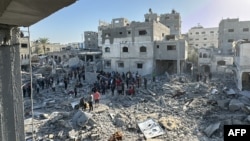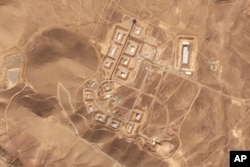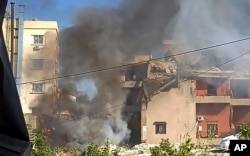Egypt’s President Abdel-Fattah el-Sissi on Sunday proposed a two-day cease-fire in the Israel-Hamas war in Gaza, with the militant group also freeing four hostages during the halt in fighting if implemented.
Neither Israel nor Hamas offered any immediate response to el-Sissi’s plan, the first he has proposed during months of playing a role, along with the United States and Qatar, in trying to broker a halt to fighting in the 13-month war and the release of the remaining 101 hostages, about one-third of whom are believed to be dead.
Speaking in Cairo, el-Sissi said the plan also calls for more humanitarian aid for famished Palestinians in Gaza, the narrow territory along the Mediterranean Sea.
El-Sissi said the proposal aims to "move the situation forward." He said that if the two-day cease-fire deal is adopted, negotiations would continue to make it permanent. There has been no cease-fire since last November's weeklong pause in fighting and hostage and prisoner exchange.
Meanwhile, Israel's Mossad chief, David Barnea, headed to Doha on Sunday for talks with Qatari Prime Minister Mohammed bin Abdulrahman Al Thani and U.S. CIA chief William Burns.
On the battlefront, fighting raged. Israeli strikes on northern Gaza killed at least 33 people, mostly women and children, Palestinian officials said Sunday, as Israel's offensive in the hard-hit and isolated area entered a third week.
U.N. Secretary-General Antonio Guterres called the plight of Palestinians there "unbearable." Israel said it targeted militants.
In a separate development, a truck rammed into a bus stop near Tel Aviv, killing one person and wounding more than 30 others. Israeli police said the attacker was an Arab citizen of Israel. The ramming occurred outside a military base and near the headquarters of Israel's Mossad spy agency.
Iran's Supreme Leader, Ayatollah Ali Khamenei, meanwhile, said Israeli strikes on the country on Saturday in response to an October 1 ballistic missile attack by Iran "should not be exaggerated nor downplayed," while stopping short of calling for retaliation. It was Israel's first open attack on its archenemy.
The United Nations Security Council will meet on Monday to discuss Israel's attack on Iran, council president Switzerland said on Sunday.
The Swiss U.N. mission said the meeting had been requested by Iran with the support of Algeria, China and Russia.
“Israeli regime's actions constitute a grave threat to international peace and security and further destabilize an already fragile region," Iran’s Foreign Minister Abbas Araqchi said in a letter to the 15-member council on Saturday.
On Sunday, Israeli Prime Minister Benjamin Netanyahu said the strikes had achieved Israel's goals.
“We severely harmed Iran's defense capabilities and its ability to produce missiles that are aimed toward us," the Israeli leader said.
Satellite images showed damage to two secretive Iranian military bases, one linked to work on nuclear weapons that Western intelligence agencies and nuclear inspectors say was discontinued in 2003, and another linked to Iran's ballistic missile program. Iran on Sunday said a civilian had been killed, with no details. It earlier said four people with the military air defense were killed.
That exchange of attacks has raised fears of an all-out regional war pitting Israel and the United States against Iran and its militant proxies, which include Hamas and the Hezbollah militant group in Lebanon, where Israel launched a ground invasion earlier in October after nearly a year of lower-level conflict.
Hamas and Hezbollah are U.S.-designated terror groups.
In its latest fighting, two Israeli strikes killed eight people in Sidon city in southern Lebanon, with 25 wounded, according to Lebanon's health ministry. One strike hit a residential building, according to footage taken by an Associated Press reporter.
The Israeli military said four soldiers, including a military rabbi, were killed in fighting in southern Lebanon, without providing details. It said five other personnel were severely wounded. An explosive drone and a projectile fired from Lebanon wounded five people in Israel, authorities said.
The latest conflict in the region began when Hamas militants killed 1,200 people and captured about 250 hostages in their Oct. 7 attack on Israel. Israel says it believes Hamas is still holding 101 hostages, including 35 the military says are dead.
Israel’s counteroffensive in Gaza has killed nearly 43,000 Palestinians, according to the territory's health ministry, which does not distinguish between combatants and civilians in its count.
Some material in this report came from The Associated Press and Reuters.









